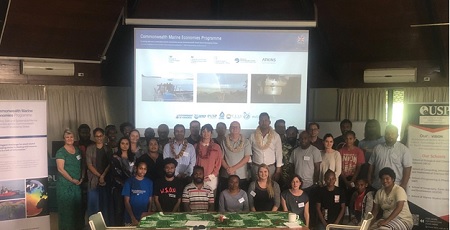Related News

The University of the South Pacific’s (USP) Emalus Campus in Vanuatu hosted an international workshop as part of the Commonwealth Marine Economies (CME) Programme from 10–14 June, 2019.
USP students and staff, Dr Krishna Kotra, Dr Gilianne Brodie and Dr Katy Soapi along with Cefas staff Dr Michelle Devlin, Dr Lisa Benson, Dr Marta Vannoni and Mr Jon Hawes had overseen the arrangements and running of the workshop.
The workshop was part of the ongoing collaborative research in accordance with the MoU being established between USP and Cefas, London, UK.
Case studies, practical training at Emalus Science Lab and field visits were all part of the three day sessions of the workshop.
Dr Krishna Kotra, Science Programme Coordinator, in his welcome speech thanked USP for providing unconditional support in organising the workshop.
He conveyed his heartfelt thanks to Cefas and Dr Michelle Devlin for choosing the Campus to host the event and Mr Ruben Markward, Campus Director, for promoting research activities that are benefiting students and staff of Emalus.
Dr Krishna said the core idea of the MoU, which was established in 2016, was to see these kinds of activities in the Campus where students and staff are involved in research activities and international discussions.
He concluded that the partnership with Cefas has benefited everyone in many ways and hoped to continue the same in future as well with many collaborative research studies in the Pacific.
Dr Michelle Devlin, Cefas lead researcher also acknowledged the strong partnership between Cefas and USP, and the excellent ongoing work that had been undertaken as part of the CME Programme in the Pacific.
The aim of this week’s workshop was to:
(i) Present the findings from the seagrass and blue carbon section of the work programme;
(ii) Deliver training to local participants on vessel-based underwater camera surveying, intertidal seagrass surveying and analysis workflow for seagrass blue carbon studies; and
(iii) Present outcomes on water quality, pollution modelling and innovative mapping work.
The CME Programme is working with the most vulnerable Small Island Developing States (SIDS) to help them gain the most of their natural maritime benefits, to enable sustainable economic growth, and to alleviate poverty.
Funded by the UK Government’s Conflict, Stability and Security Fund (CSSF) and led by the Foreign and Commonwealth Office, the CME Programme is delivering world leading expertise in marine science through its main delivery partners: the United Kingdom Hydrographic Office (UKHO), the Centre for Environment, Fisheries and Aquaculture Science (Cefas) and the National Oceanography Centre (NOC).
Cefas has been working with regional and national partners in Vanuatu to help develop an ongoing risk assessment to identify key issues facing Vanuatu’s communities and marine ecosystems.
The programme has been wide ranging in scope, with data collected through field trips, monitoring and using technology such as remote sensing to underpin seagrass mapping, carbon valuations, water quality monitoring and assessment.
A climate change report card has also been produced for the Pacific with outcomes for Vanuatu.